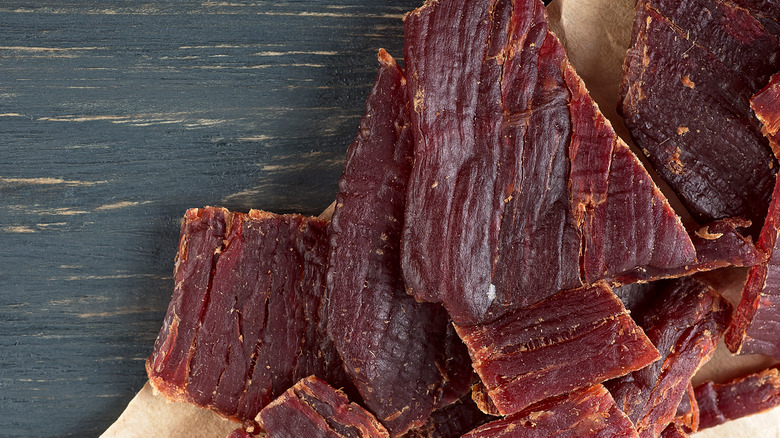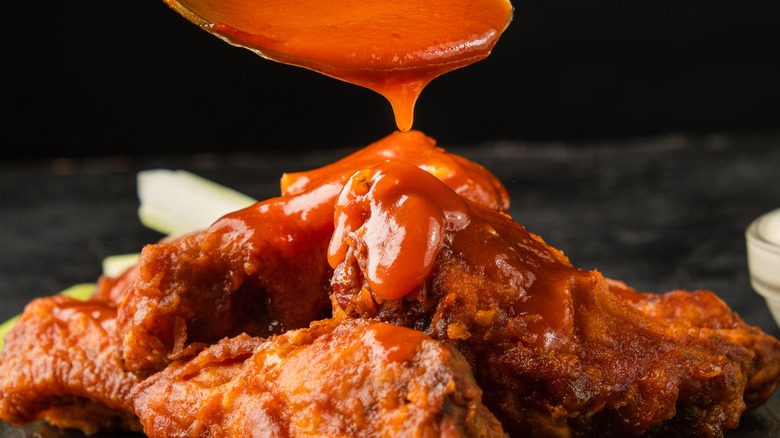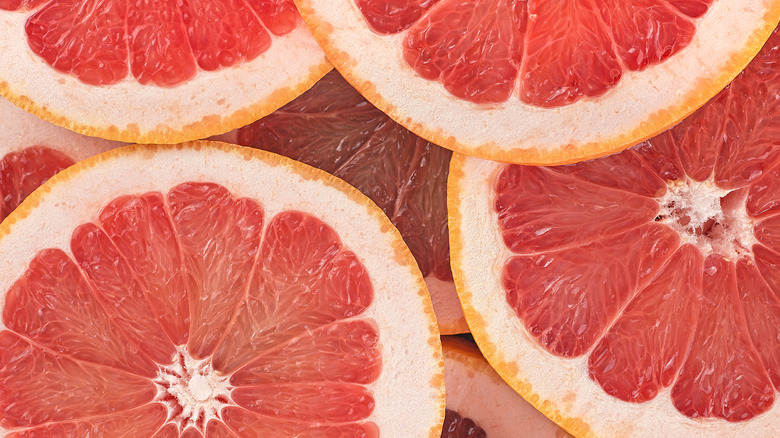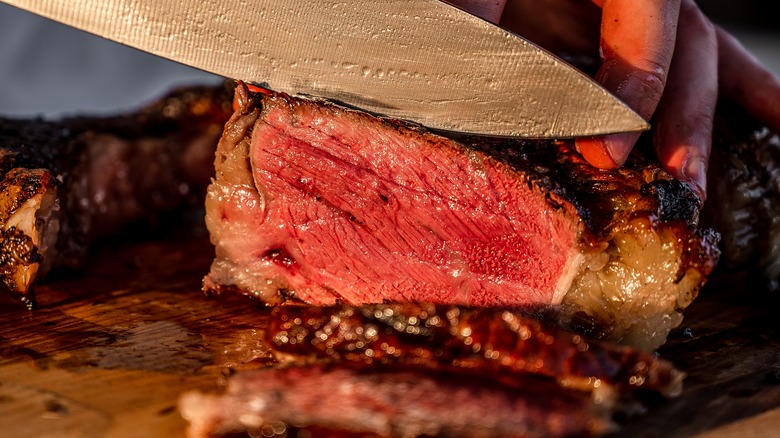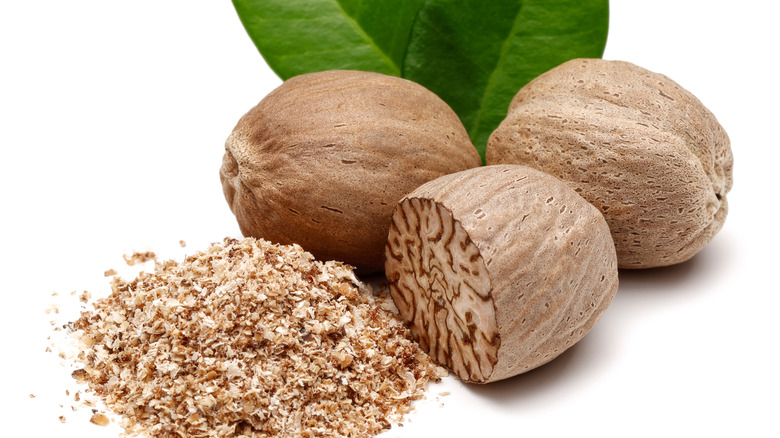Common Foods With Bizarre Side Effects
You probably don't think much about the food you eat, aside from how it tastes and how good or bad for you it is. Food is more complex than that, though. Many foods contain substances that have a wide range of effects on your body, some of which can be rather bizarre.
You may be familiar with some of the more common reactions — for example, caffeine can make you anxious and sleepless, and spicy foods can make you sweat. But did you know that carrots, if eaten in large enough quantities can actually turn your skin orange (via Cleveland Clinic)? You may love carrots, but unless you're an Oompa Loompa, orange is probably not the skin color you're going for.
Other foods that can have some pretty weird effects include beef jerky, nutmeg, margarine, and a rare Japanese delicacy called fugu (which can actually kill you). Read on to find out more about these edibles, and whether you need to avoid or just reduce the amounts you eat to prevent your favorite food from turning into your worst nightmare.
Carrots can turn your skin orange
Crunchy carrots are the perfect vehicle for getting your favorite dip into your mouth, and they're among the healthiest foods you can eat. Low in calories and high in fiber, eating carrots can help regulate digestion, improve cholesterol and heart health, and help you manage your weight (via BBC Good Food). Carrots are also a particularly rich source of vitamin A, which can boost your immune system and protect the health of your eyes (via the National Institutes of Health).
Carrots contain beta-carotene, a carotenoid antioxidant that the body converts to vitamin A and helps protect against cell-damaging free radicals (via Mount Sinai and Science Direct). This plant pigment gives carrots their bright orange color. In moderation, this pigment doesn't pose any problems, but when consumed in large amounts, it can result in a condition known as carotenemia, in which the skin turns an orangey hue. It's not a common occurrence, but as Dr. Melissa Piliand, MD, told the Cleveland Clinic, eating approximately 10 medium-sized carrots a day over a period of a few weeks could change your skin color.
Carotenemia is more likely to affect parts of the body with thicker skin, such as the palms of the hands and soles of the feet, the knees, elbows, and the crevices around the nose. It's not a dangerous condition, and it's easy to resolve: Simply reduce your intake of orange produce in favor of fruits and veggies of other colors.
Beef jerky may cause mania
Beef jerky isn't the healthiest food you can eat. It's high in sodium, with just 1 ounce providing 22% of the Daily Value (DV) (via MyFoodData). It's also high in saturated fat and cholesterol. While beef jerky recipes vary, many are highly processed, containing preservatives such as nitrates or artificial flavorings that can be dangerous for your health (via the Washington Post). Eating too much processed meat has been linked to the development of cancer, diabetes, and heart disease (via Harvard T.H. Chan School of Public Health).
Beef jerky has another worrying side effect: It can make you manic. According to a 2018 Johns Hopkins Medicine study involving over 1,000 people, chemicals in preserved meats can cause an abnormal mood state called mania, involving feelings of euphoria, hyperactivity, and insomnia. The results revealed that individuals (with or without psychiatric disorders) who were hospitalized for manic episodes were three times more likely to have a history of eating nitrate-cured meats than those who have not been previously diagnosed with a psychiatric disorder. Animal studies conducted by the same researchers revealed similar results, with rats consuming short-term diets with nitrates exhibiting manic hyperactivity.
Not all beef jerky contains nitrates, but many do, so it's important to read labels carefully. Better yet, make your own at home with fresh ingredients, and eat it sparingly to avoid the other health consequences of diets high in saturated fat and sodium.
Asparagus may make your pee smell
Asparagus seems harmless enough. It's certainly good for you, with its high amounts of fiber, vitamin C, iron, potassium, and phosphorous. But it has a hidden side effect that can make you wonder whether it's worth including in your diet: odiferous urine.
Post-asparagus pee has a pungent, rotten smell that can appear just minutes after your meal and last up to 14 hours (via Healthline). The cause is asparagusic acid — only found in asparagus — which is broken down into sulfur byproducts. These byproducts exit the body via your urine, hence the smell.
The good news is it's not dangerous, and unless you're urinating around someone else, it's not going to disturb anyone but you. Plus, it may not even affect you: Only about 20-50% of people will experience the phenomenon, according to the Cleveland Clinic. The reason for this may be because digestion differs from person to person, and some people's digestive systems may be better able to break down asparagusic acid. Another reason could be genetics: Some people simply aren't able to smell the odor.
Unfortunately, there's nothing you can do to prevent post-asparagus urine. But this isn't a reason to stop eating asparagus. This stalky green vegetable has way too many good things going for it to give it up on the off chance it might make your pee smell for a few hours.
Hot sauce can disrupt your sleep
Some like it hot, and we can't blame them. Nothing ignites the senses and tickles the palate like a dish of spicy food. And a little spicy food is good for you. Hot peppers contain a compound called capsaicin, which research shows may provide a host of benefits. Some of those include boosting heart and digestive health, reducing inflammation, helping the body break down fats and burn more calories, and suppressing your appetite. In fact, registered dietitian and nutritionist Patricia Bridget Lane told the Cleveland Clinic that people who eat spicy food regularly tend to consume less food overall.
However, research shows they may get less sleep, too. In a 1992 study published in the International Journal of Psychophysiology, a meal containing Tabasco and mustard significantly disrupted the sleep of a small pool of healthy male subjects. Participants experienced decreased amounts of stage 2 and 3 sleep. Reduced amounts of these sleep stages may affect cognitive functioning and interrupt the repair and regrowth of tissues, including bone and muscle. It may also impair immune function (via NIH). Study participants also took longer to fall asleep. Researchers hypothesized that changes in body temperature caused by capsaicin are to blame.
Grapefruit increases melanoma risk
Melanoma, a type of skin cancer that affects the cells that produce skin color, is on the rise, with rates increasing by 1% each year in women, according to the American Cancer Institute. Exposure to ultraviolet (UV) rays is the most common cause of melanoma (via NIH). Having fair skin or a history of bad sunburns, among other things, increases your risk for melanoma, as does something else you wouldn't expect: eating lots of citrus fruits, especially grapefruit.
A 2015 study in the Journal of Clinical Oncology assessed the diets of over 1,800 men and women with melanoma over almost three decades. They found that the rate of malignant melanoma increased proportionately with the amount of citrus fruits consumed on a weekly and daily basis. Grapefruit had the greatest association with melanoma risk, regardless of other dietary and lifestyle factors.
Grapefruits have loads of vitamin C, with one medium fruit providing your entire daily requirement for the immune-boosting nutrient (via Johns Hopkins Medicine). But according to researchers of the 2015 study, citrus fruits also contain high amounts of naturally occurring chemicals called psoralens and furocoumarins, which have potentially carcinogenic properties. Dermatologist Eric Millican, MD, explained to the University of Utah that these chemicals can increase absorption of UV rays, which in turn increases cancer-causing DNA damage.
The good news is you don't have to give up grapefruit, but you should take extra precautions to protect your skin from UV rays from the sun and tanning beds.
Cilantro tastes like soap (for some)
The belle of the ball in Mexican cuisine, cilantro is hard to avoid in a trip South of the Border. And it's hugely popular in many other cuisines around the globe. For most people, cilantro adds a burst of fresh, citrusy flavor to everything from soups to smoothies. But for some people, cilantro is less than appetizing, with a flavor reminiscent of something you should clean with rather than eat.
For those who think cilantro tastes like soap — or dirt, mold, or bugs in some cases — genetics may be to blame (via the BMC). Cilantro contains organic chemical compounds called aldehydes, which most people don't perceive as off-putting (via Britannica). But a small number of people have a genetic variation that causes them to identify the flavor of aldehydes differently — disdainfully — compared to the rest of the population. This genetic variation is more common in places where cilantro isn't as widely consumed, such as East Asia. In this part of the world, almost 20% of people report sensing a soapy flavor, while that perception is much less common in cilantro-loving locations like India and Central America.
If you're among the haters, don't fret — there are many other herbs that can stand in for cilantro in your favorite dishes, such as parsley, Thai basil, and dill. However, it might interest you to know that some people can overcome their cilantro repulsion with repeated exposure. The question is, is it worth it?
Margarine may cause aggression
Margarine contains trans fatty acids. These are synthetic fats created through hydrogenation, a process that stabilizes polyunsaturated oils so that they remain solid at room temperature, extending their shelf life (via MedlinePlus). Of all the types of fats, trans fats are the absolute worst; they're linked with an increased risk of heart disease, diabetes, and cancer (via NIH).
You have every right to lash out if you say, "Please pass the butter," and someone hands you margarine. There is no substitute for the rich, creamy flavor of real butter. But that's not the kind of aggressiveness we're referring to here: A 2012 study in PLoS One surveyed 945 men and women and found that consuming trans fats was associated with an increase in aggressive and irritable behavior. The more trans fats participants consumed, the higher their risk of aggressive, irritable, and impatient behavior.
A potential reason for this is that trans fatty acids prohibit production of docosahexaenoic acid (DHA), an omega-3 fatty acid that can be protective against aggression. DHA is a polyunsaturated fat found in healthy foods like fish, along with another omega-3 called eicosapentaenoic acid (EPA). Together, these two fatty acids have been shown to decrease depression and anxiety, while enhancing cognitive ability (via Harvard Health Publishing). DHA on its own may help reduce aggression in stressful situations, per a 2014 study in the Journal of Psychosomatic Research.
Caffeine can cause hallucinations
Next time you're at your desk enjoying your mid-morning cup of joe and see a giant pink elephant in the cubicle next door, don't worry: It's totally normal. Okay, we're exaggerating, but it's not far off the truth, especially if it's your fourth or fifth cup of the day.
You probably know that the caffeine in coffee, tea, and energy drinks can have a variety of physical and mental effects, especially when you have too much. These include dehydration, rapid heartbeat, shaky hands, anxiety, and sleeplessness (via the Better Health Channel). Apparently, it can also make you see things that aren't there.
Caffeine is part of a chemical group called xanthines, which act on the adenosine receptors in the central nervous system. It also reduces the reuptake speed of the neurotransmitter dopamine and raises the release of the neurotransmitter glutamate. According to MDedge, this could theoretically induce psychosis, a state in which an individual loses their grasp on reality via hallucination, delusions, or paranoia (via Psychology Today). Excess caffeine intake can worsen symptoms of psychosis in people with pre-existing mental disorders, but it can also cause psychosis in otherwise healthy people.
So how much do you need to drink to experience the effects? In one study, 20 milligrams of caffeine per kilogram of body weight daily was enough to induce psychosis in a paranoid schizophrenic patient who had been in remission for several years. In healthy people, the effective amounts might be significantly higher: 150 to 200 milligrams per kilogram.
Meat may cause body odor
Skipping red meat is likely to make you more alluring to vegetarians, but it might also increase your attractiveness to the general public, at least when it comes to how you smell. A 2006 study in Chemical Senses observed the body odor of two groups of males over a two-week period. One group consumed meat, and the other did not. Researchers used pads to collect body odor samples, and then presented them to women who assesses the smells for "pleasantness, attractiveness, masculinity, and intensity." Results revealed that the men who ate meat rated significantly lower in pleasantness, attractiveness, and intensity, but not in masculinity.
Researchers hypothesized the results were due to an abundance of odiferous substances secreted by apocrine sweat glands in the meat-eaters' diets. They also said that genetics may be involved, but more research needs to be done to get to the meat (pun intended) of the matter.
Another hypothesis about why meat may cause bad body odor is that residue in the intestines from the amino acids in meat may interact negatively with bacteria in sweat (via NextAvenue). Or, as a sulfur-rich food, your sweat post-meat-eating may take on a sulfurous odor, which tends to have hints of rotten eggs (via the Cleveland Clinic).
Interestingly, the opposite is true of garlic. According to a 2016 study in Appetite, garlic consumption had a positive effect on perceived attractiveness, pleasantness, and intensity of body odor. On your next date, it might be wise to choose the roasted garlic pasta over the ribeye.
Nutmeg can be toxic
This seemingly innocuous spice that no pumpkin pie should be without shouldn't be taken with a grain of salt. In fact, it should be taken quite seriously, especially if you have teenagers in the house. Compared to the cinnamon challenge, in which teens (and some adults, if we're being honest) attempt to swallow a spoonful of cinnamon without any liquid to help wash it down, the nutmeg challenge is much riskier (via Meshbesher & Spence). A trend that went viral via social media, many kids are eating or drinking excessive amounts, smoking, or snorting the spice to get high. Little do they know, the effects can be sickening — and even deadly.
While some may experience out-of-body sensations similar to being high after consuming 2 tablespoons or more in one go, more likely symptoms include nausea, dizziness, severe dry mouth, and slowed cognitive function (via The New York Times). It can make your body feel extremely sluggish, affect your memory in the moment, and lead to a hangover that often lasts for days afterwards. These effects are due to a compound in nutmeg called myristicin, a member of a family of substances that can be potentially psychoactive. In fact, they're often used in recipes for much more powerful psychotropic drugs, such as MDMA, also known as ecstasy or molly.
Fugu fish can be deadly
The Japanese have some culinary traditions that can seem quite bizarre to Westerners — slurping spiny sea urchin and eating intestines, fish sperm sacks, and slug-like sea cucumbers among them (via LiveJapan). Perhaps most mind-boggling is their affinity for a potentially deadly sea creature called fugu (or pufferfish).
The liver, ovaries, and other organs of the puffer fish are extremely toxic, with a neurotoxin that's "1,000 times more powerful than potassium cyanide" (via The Guardian). Any small error in removing these parts from the fish can kill the consumer. In fact, it's so lethal that Japanese chefs must be licensed to prepare and serve fugu (via Nikkei Asia). According to Fine Dining Lovers, improperly prepared fugu fish killed approximately one diner a week in Japan in the '80s. Although that number has fallen drastically, deaths do still happen.
So why do Japanese diners take the risk? Part of it is thrill-seeking. It's a little like Russian roulette: Will you or won't you survive? Another part of it is extravagance. According to Business Insider, the delicacy costs about $120/pound. Eating fugu in Japan might be a once-in-a-lifetime experience, literally. But is the payoff worth the risk?



